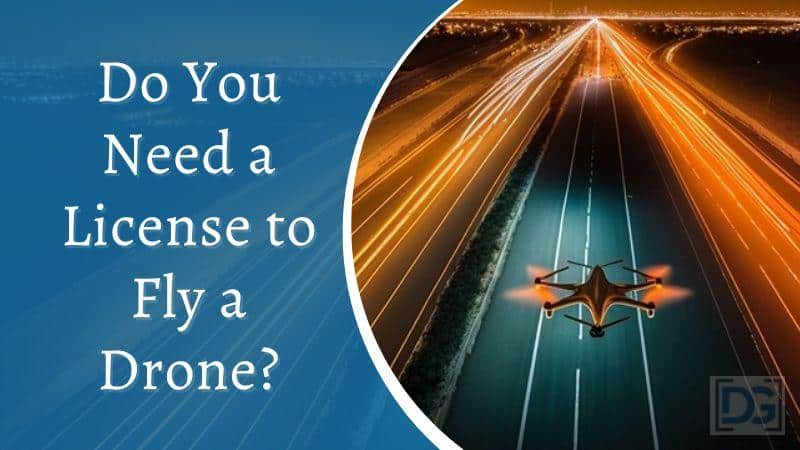With the increasing popularity of drones for recreational and commercial purposes, many people are wondering, “Do I need a license to fly a drone?” The answer depends on various factors, including the country you are flying in, the weight of the drone, and whether you’re flying for recreational or commercial purposes. This guide will provide a detailed overview of drone licensing requirements, helping you understand when you need a license, the different types of licenses available, and how to obtain one.
Do You Need a Drone License? The Basics
Recreational vs. Commercial Use
One of the most important factors in determining whether you need a license to fly a drone is the purpose of your drone flying:
- Recreational Use: Flying for fun, as a hobby, or for personal enjoyment. In most cases, you don’t need a full license for recreational flying, but you may need to follow specific rules and register your drone if it weighs more than a certain amount.
- Commercial Use: Using a drone for business purposes, such as aerial photography, real estate, surveying, inspections, or agricultural work. If you are flying for commercial purposes, you will likely need a drone license or certification.
Drone Weight
The weight of your drone also plays a significant role in determining if you need a license. Generally:
- Drones under 250 grams (0.55 pounds): Often exempt from licensing requirements, especially for recreational use.
- Drones over 250 grams: Typically require registration, and a license may be needed depending on the intended use.
Drone Licensing Requirements by Country
United States
In the U.S., the Federal Aviation Administration (FAA) oversees drone regulations.
- Recreational Flying: You don’t need a license, but you must follow the FAA’s recreational flying rules, including:
- Registering your drone if it weighs over 250 grams.
- Passing the FAA TRUST (The Recreational UAS Safety Test), which is a free online safety test.
- Flying below 400 feet and within visual line-of-sight.
- Commercial Flying: You need a Part 107 Remote Pilot Certificate from the FAA. This requires passing a knowledge test covering topics such as airspace rules, weather, and drone regulations.
United Kingdom
The Civil Aviation Authority (CAA) governs drone flying in the UK.
- Recreational Flying: You must have a Flyer ID and register your drone if it weighs between 250g and 20kg. You also need to take an online theory test to obtain the Flyer ID.
- Commercial Flying: If your drone weighs more than 250g and you intend to use it for commercial purposes, you need an Operational Authorisation from the CAA, which may involve completing a training course.
European Union
The European Union Aviation Safety Agency (EASA) has introduced unified drone regulations across member countries.
- Open Category: For low-risk operations, divided into subcategories (A1, A2, A3) based on drone weight and operational risk. No license is needed for flying drones under 250g, but registration is required for drones over that weight.
- Specific Category: For higher-risk operations, requiring an operational authorization based on a risk assessment.
- Certified Category: For complex, high-risk operations, Egadgettech Tech requiring certification similar to manned aviation.
Canada
Transport Canada oversees drone regulations.
- Basic Operations: If you’re flying in uncontrolled airspace and away from people, you need a Basic Drone Pilot Certificate, which requires passing an online exam.
- Advanced Operations: If flying in controlled airspace, near people, or for commercial purposes, you need an Advanced Drone Pilot Certificate, which requires an online exam and an in-person flight review.
How to Get a Drone License
Step-by-Step Process for Obtaining a Drone License in the United States (FAA Part 107)
- Meet the Eligibility Requirements: Be at least 16 years old and able to read, speak, write, and understand English.
- Study for the Test: Study topics such as airspace regulations, weather, drone performance, and safety.
- Schedule the Exam: Register for the FAA Part 107 exam at an approved testing center.
- Pass the Exam: The test includes 60 multiple-choice questions, and you need a score of 70% or higher to pass.
- Complete the FAA Form 8710-13: Once you pass the test, complete this form to apply for your Remote Pilot Certificate.
- Receive Your License: You’ll receive a temporary certificate, followed by your permanent license in the mail.
Common Rules and Regulations for Drone Flying
Regardless of whether you need a license, all drone pilots must follow certain rules to ensure safe and responsible flying. These rules include:
- Always fly within your visual line of sight.
- Fly below 400 feet.
- Avoid flying near airports, airfields, or restricted airspace.
- Do not fly over people or moving vehicles.
- Check local laws and regulations before flying in public spaces or private property.
Tips for Flying Drones Safely
- Check Weather Conditions: Avoid flying in windy, rainy, or foggy weather, as this can affect your drone’s stability and visibility.
- Inspect Your Drone Before Every Flight: Check for any damages, loose parts, or battery issues to ensure safe operation.
- Stay Updated with Regulations: Drone laws can change, so regularly check for updates to ensure compliance.
Benefits of Having a Drone License
1. Professional Opportunities
Having a drone license opens up various commercial opportunities in industries like real estate, agriculture, surveying, construction, and photography.
2. Increased Knowledge and Skills
The process of obtaining a drone license equips you with essential knowledge about airspace, weather conditions, safety regulations, and emergency procedures.
3. Compliance with the Law
Operating a drone legally and responsibly ensures you avoid potential fines, penalties, or legal issues associated with unlicensed drone operation.
Conclusion
Whether you need a license to fly a drone depends on your location, the weight of your drone, and whether you’re flying for recreational or commercial purposes. It’s essential to understand and comply with the rules and regulations set by aviation authorities in your country to ensure safe and legal drone operation.
If you’re flying for commercial purposes or using a drone that weighs more than 250 grams, it’s highly likely that you will need to obtain a drone license or certification. By following the guidelines and obtaining the necessary license, you can enjoy a seamless and worry-free drone flying experience.









